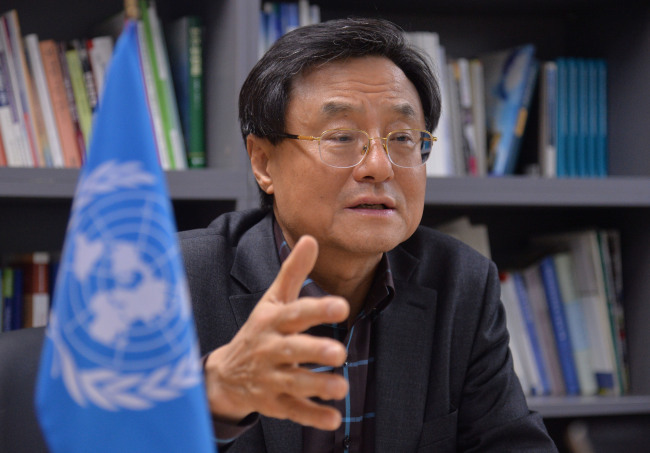[Herald Interview] ‘E-government key to good governance’
By Shin Hyon-heePublished : April 27, 2014 - 21:10
This is the fifth installment in a series of interviews with chiefs of United Nations offices in Korea. ― Ed.
With Korea’s advanced information technology, its know-how in e-government services could provide a key tool for developing countries to help achieve good governance and effective public administration, the head of the U.N. Project Office on Governance said.
“E-government is one of the best paths to good governance that the humans have found so far, playing a key role in achieving a wide array of domestic and global policy objectives,” UNPOG director Lim Jae-hong said in a recent interview with The Korea Herald.
The organization was set up in 2006 as a subsidiary of the U.N. Department of Economic and Social Affairs with the principal aim of assisting member states to improve their governance capacity for 10 years. Its work is financed by an annual $1 million trust fund run by Seoul’s Ministry of Security and Public Administration.
In recent years, the idea of e-governance has emerged across the UNPOG’s three pillars of activities ― research and policy development, capacity development, and communication and outreach ― with Korea being a good example as a vibrant democracy and IT powerhouse, according to its director.
Its concept, he noted, also embraces the eight key components of good governance laid out by the U.N. Economic and Social Commission for Asia and the Pacific: accountable, transparent, responsive, equitable and inclusive, effective and efficient, follows the rule of law, participatory and consensus-oriented.
With Korea’s advanced information technology, its know-how in e-government services could provide a key tool for developing countries to help achieve good governance and effective public administration, the head of the U.N. Project Office on Governance said.
“E-government is one of the best paths to good governance that the humans have found so far, playing a key role in achieving a wide array of domestic and global policy objectives,” UNPOG director Lim Jae-hong said in a recent interview with The Korea Herald.
The organization was set up in 2006 as a subsidiary of the U.N. Department of Economic and Social Affairs with the principal aim of assisting member states to improve their governance capacity for 10 years. Its work is financed by an annual $1 million trust fund run by Seoul’s Ministry of Security and Public Administration.
In recent years, the idea of e-governance has emerged across the UNPOG’s three pillars of activities ― research and policy development, capacity development, and communication and outreach ― with Korea being a good example as a vibrant democracy and IT powerhouse, according to its director.
Its concept, he noted, also embraces the eight key components of good governance laid out by the U.N. Economic and Social Commission for Asia and the Pacific: accountable, transparent, responsive, equitable and inclusive, effective and efficient, follows the rule of law, participatory and consensus-oriented.

Lim pinned high hopes on President Park Geun-hye’s vision for “Government 3.0,” which calls for broader public access to state data and participation in the decision-making process, increased transparency and greater interagency cooperation.
The initiative followed the “e-Korea Vision 2006,” a third edition of the four-year national “informatization” plan unveiled in 2002. The package included building ICT capacity and industry, promoting e-commerce, upgrading the legal system and stepping up international cooperation.
“I think Korea’s public administration system has advanced very much along the lines of technological development, making more information available and expanding communications with citizens,” he said.
“The ‘Government 3.0’ drive will help Seoul maintain its leading position in the e-government field as it basically seeks to create new values through open data, information sharing and communications.”
A former ambassador to Thailand and Sri Lanka, Lim took the helm of the UNPOG last October shortly after retiring from the Foreign Ministry. During his 35-year diplomatic career, he assumed various posts related to the U.N. and the development issue, including chief of planning and coordination, minister-counselor at the mission to the U.N. in New York, and director for human rights and social affairs.
He is gearing up for three major projects this year: the annual U.N. Public Service Awards, an international e-government forum and the launch of the biennial U.N. e-Government Survey in which Korea topped the list over the last four years.
The awards mark the most prestigious international recognition of excellence in public service, officials say. This year’s ceremony will take place on June 23 in Ilsan, Gyeonggi Province, as the centerpiece of a four-day public service forum organized by the UNPOG and New York-based DESA.
The two agencies launched the e-government forum in Seoul in 2012 to boost the understanding on the concept around the world. The yearly event will be held in Kazakhstan in October.
With the office’s 10-year term nearing its end, Lim is stepping up efforts to turn it into a permanent organization with greater financial capabilities and a bigger workforce so that it can help more developing countries beyond the Asia-Pacific.
“It will not be a wise decision to give up on the investment that we have made throughout the past decade ― governance is an idea that will dominate the 21st century, not a waning industry or a thing of the past,” the director added.
“I’m hoping that the UNPOG will be able to assist those in need such as least developed, post-conflict or landlocked countries, expanding its foray into Africa, the Middle East and Latin America.”
By Shin Hyon-hee (heeshin@heraldcorp.com)








![[KH Explains] Hyundai's full hybrid edge to pay off amid slow transition to pure EVs](http://res.heraldm.com/phpwas/restmb_idxmake.php?idx=644&simg=/content/image/2024/04/18/20240418050645_0.jpg&u=20240419100350)






![[From the Scene] Monks, Buddhists hail return of remains of Buddhas](http://res.heraldm.com/phpwas/restmb_idxmake.php?idx=652&simg=/content/image/2024/04/19/20240419050617_0.jpg&u=20240419175937)

![[KH Explains] Hyundai's full hybrid edge to pay off amid slow transition to pure EVs](http://res.heraldm.com/phpwas/restmb_idxmake.php?idx=652&simg=/content/image/2024/04/18/20240418050645_0.jpg&u=20240419100350)

![[Today’s K-pop] Illit drops debut single remix](http://res.heraldm.com/phpwas/restmb_idxmake.php?idx=642&simg=/content/image/2024/04/19/20240419050612_0.jpg&u=)